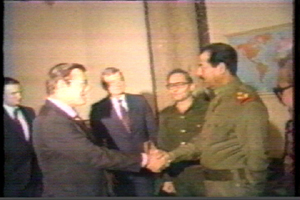 http://www.gwu.edu/~nsarchiv/NSAEBB/NSAEBB82/
http://www.gwu.edu/~nsarchiv/NSAEBB/NSAEBB82/Shaking Hands with Saddam Hussein:
The U.S. Tilts toward Iraq, 1980-1984
<snip>
The U.S. was officially neutral regarding the Iran-Iraq war, and claimed that it armed neither side. Iran depended on U.S.-origin weapons, however, and sought them from Israel, Europe, Asia, and South America. Iraq started the war with a large Soviet-supplied arsenal, but needed additional weaponry as the conflict wore on.
Initially, Iraq advanced far into Iranian territory, but was driven back within months. By mid-1982, Iraq was on the defensive against Iranian human-wave attacks. The U.S., having decided that an Iranian victory would not serve its interests, began supporting Iraq: measures already underway to upgrade U.S.-Iraq relations were accelerated, high-level officials exchanged visits, and in February 1982 the State Department removed Iraq from its list of states supporting international terrorism. (It had been included several years earlier because of ties with several Palestinian nationalist groups, not Islamicists sharing the worldview of al-Qaeda. Activism by Iraq's main Shiite Islamicist opposition group, al-Dawa, was a major factor precipitating the war -- stirred by Iran's Islamic revolution, its endeavors included the attempted assassination of Iraqi Foreign Minister Tariq Aziz.)
Prolonging the war was phenomenally expensive. Iraq received massive external financial support from the Gulf states, and assistance through loan programs from the U.S. The White House and State Department pressured the Export-Import Bank to provide Iraq with financing, to enhance its credit standing and enable it to obtain loans from other international financial institutions. The U.S. Agriculture Department provided taxpayer-guaranteed loans for purchases of American commodities, to the satisfaction of U.S. grain exporters.
The U.S. restored formal relations with Iraq in November 1984, but the U.S. had begun, several years earlier, to provide it with intelligence and military support (in secret and contrary to this country's official neutrality) in accordance with policy directives from President Ronald Reagan. These were prepared pursuant to his March 1982 National Security Study Memorandum (NSSM 4-82) asking for a review of U.S. policy toward the Middle East.